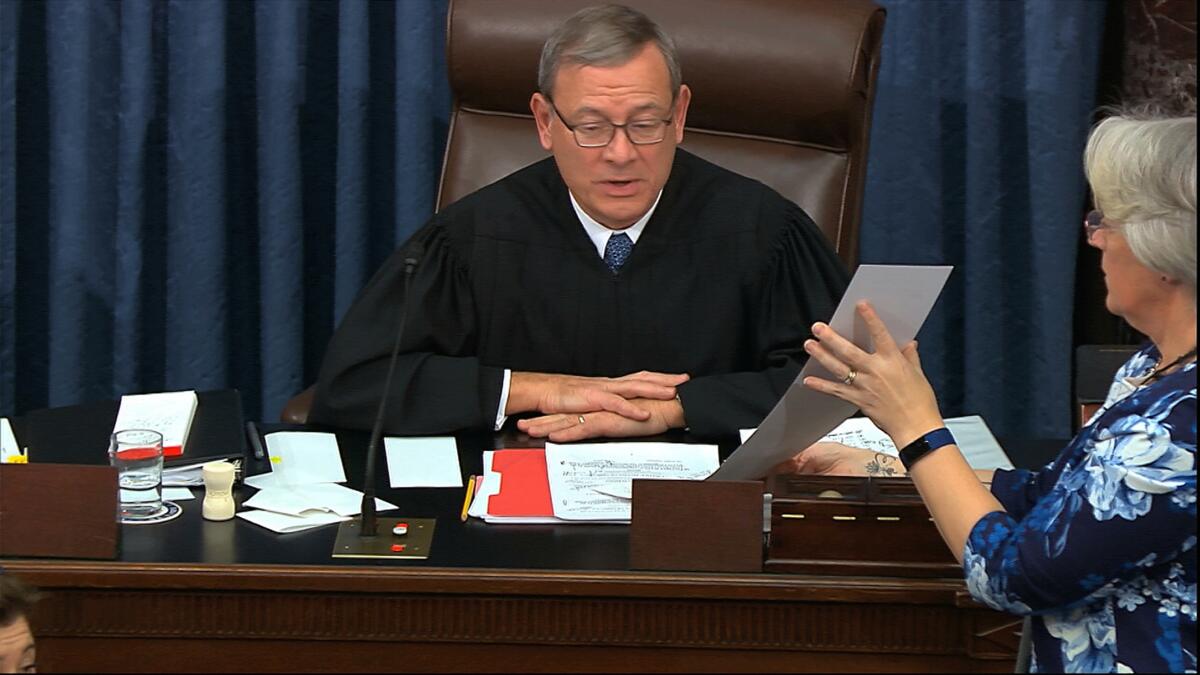What happens if senators are tied 50-50 on whether to call impeachment witnesses?

WASHINGTON — With increasing prospects of a 50-50 tie on the Friday vote to subpoena witnesses in President Trump’s impeachment trial, Democrats are considering how they might be able to nudge Chief Justice John G. Roberts Jr. to weigh in on the issue and break the deadlock.
Under normal circumstances, Vice President Mike Pence, as the Senate’s presiding officer, would break a tie. But with Roberts overseeing the impeachment trial instead, a constitutional debate has been quietly playing out over whether Roberts could, or should, play the same role.
Democrats say Roberts can, but most Republicans take the view that under Senate rules, a tie vote would mean a motion — such as one demanding witnesses — would simply fail.
Many legal scholars agree, questioning whether the chief justice even has the right to break a tie.
And few on Capitol Hill expect Roberts would even want to decide a question with such huge political ramifications. No matter what he decided on witnesses, Roberts would almost certainly be accused by the losing side of playing politics.
There are risks for Democrats, too. If Roberts ruled against calling witnesses, it would be hard for Democrats to dismiss the Senate trial as a sham over its failure to issue subpoenas, since Roberts — at their behest — would have blessed that decision.
The House of Representatives intends to vote to impeach President Trump for abusing his office and obstructing Congress, a condemnation that only two other U.S. presidents have faced in the nation’s 243-year history. Despite the historic nature of the vote on charging the president with committing high crimes and misdemeanors, Trump’s fate has been sealed for days, if not weeks in the Democratic-controlled House.
But the question has left a sense of the unknown in the third presidential impeachment trial in American history.
“Is it possible we’ll have a 50-50 vote? Of course,” said Sen. John Kennedy (R-La.). “What’ll happen after that, I don’t think anyone knows.”
A tie would devolve into a deep-in-the-weeds debate on Senate rules and procedure, but one with significant political repercussions on the pending question of whether the Senate trial will open up to witness subpoenas.
Democrats from the start of the trial have been suggesting that decisions on witnesses be left to Roberts. One such Democratic amendment was already voted down by Republicans. And during a question-and-answer session Wednesday, President Trump’s attorneys repeatedly rejected the idea of Roberts weighing in on other legal decisions that could come up if witnesses are approved, such as an expected tussle over the president’s right to claim executive privilege to block certain witness testimony.
Still Democrats are considering how they may try again, such as seeking a vote on a motion that would specifically enable the chief justice to break the tie.
“I think we’d like him to,” said Sen. Sherrod Brown (D-Ohio).
“Absolutely,” said Sen. Chris Coons (D-Del.) when asked if Democrats should ask the chief to break a tie. “It would seem to me that if we’re literally sort of hanging on a precipice, we would.”
The top Democrat in the Senate, Minority Leader Charles E. Schumer (D-N.Y.), refused to address how Democrats would proceed.
“Right now our focus is on getting four Republicans,” he said, which would push the vote to 51-49 and eliminate any tie. “We should not have to rely on what the chief justice will or will not do.”
Democrats have little to lose by trying to involve the chief justice. Though Sens. Susan Collins (R-Maine) and Mitt Romney (R-Utah) have both said they are likely to support hearing from witnesses, it’s unclear whether there is even one more vote, much less two. Sen. Lisa Murkowski (R-Alaska), a third potential vote for witnesses, hasn’t tipped her hand.
There is precedent for the chief justice to break a tie during a presidential impeachment. During the first presidential impeachment trial against President Andrew Johnson in 1868, then-Chief Justice Salmon Chase broke two ties, but refused to break a third.
Chase’s actions were challenged but eventually upheld in a Senate vote, setting precedent that helps Democrats. But Chase’s votes remain controversial. The issue never came up in the impeachment trial of President Clinton in 1999.
Republicans argue that the chief justice cannot weigh in, pointing to existing Senate rules that count a 50-50 tie as a loss.
“I don’t think he can vote. I know he can’t vote,” said Sen. Lindsey Graham (R-S.C.), chairman of the Judiciary Committee.
Ultimately, the question — if it arises — may have to be settled by a Senate vote, as it was during the Johnson impeachment. That could bode poorly for Democrats.
Even Republicans who join Democrats to subpoena witnesses may nevertheless be reluctant to have the chief justice — who is not elected — weigh in on such a political matter in such a consequential way.
If Roberts uses his position to break a tie, Sen. Mike Braun (R-Ind.) suggested, there may be enough votes to override him.
“If the senators don’t like it, we’ve got the ability with 51 votes to maybe do differently,” he said, referring to current Senate impeachment rules that allow lawmakers to override the chief justice’s rulings with a simple majority. “There’s a lot of uncertainty in terms of what happens with the presiding officer. Especially being the chief justice.”
Still unclear? What happens if that vote also ends in a tie.
Times staff writers Molly O’Toole, Sarah D. Wire and Erin B. Logan in Washington contributed to this report.
More to Read
Get the L.A. Times Politics newsletter
Deeply reported insights into legislation, politics and policy from Sacramento, Washington and beyond. In your inbox three times per week.
You may occasionally receive promotional content from the Los Angeles Times.












